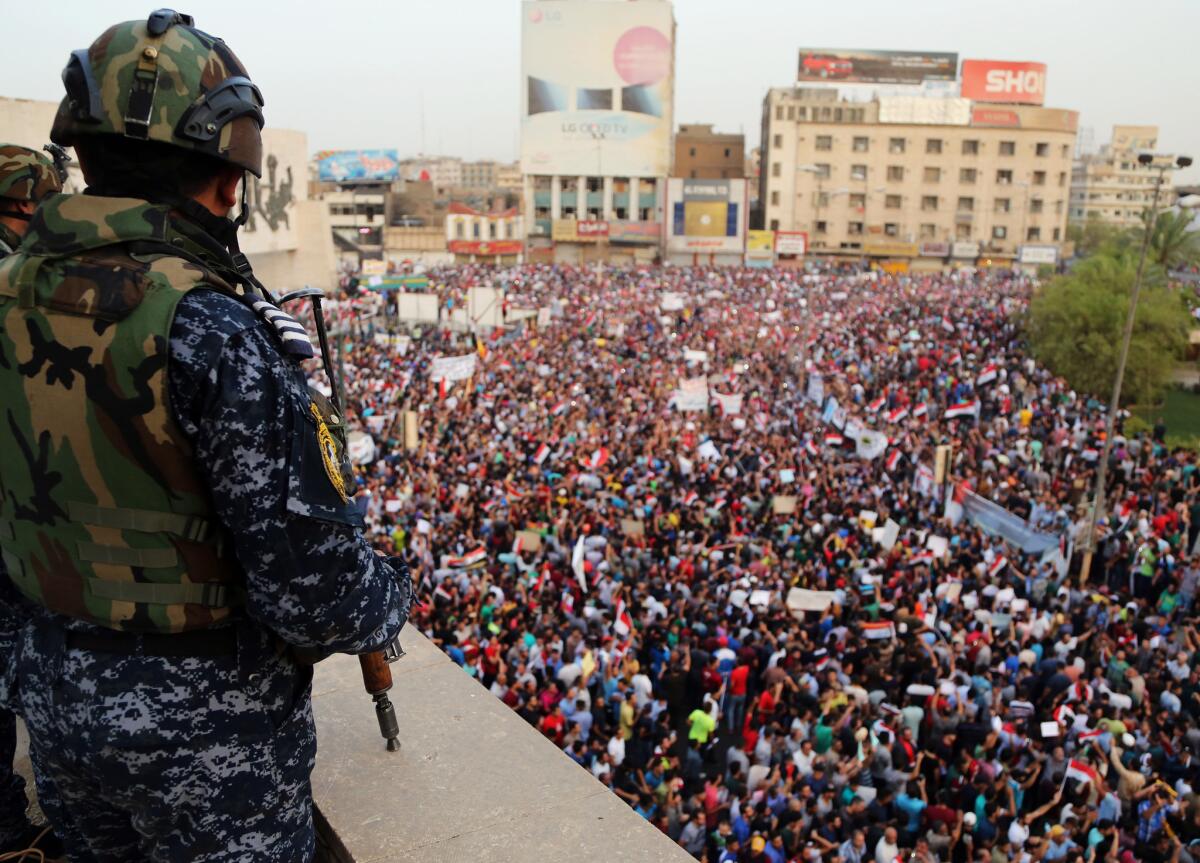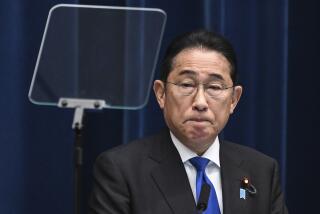Can Iraq’s president win passage of sweeping reform plan?

An Iraqi federal police officer stands guard as protesters, critical of government actions and expenditures, pack Tahrir Square in Baghdad on Friday.
Responding to weeks of street protests, Iraqi Prime Minister Haider Abadi issued an edict Sunday designed to crack down on corruption and slash government expenditures.
In a statement issued by his office, the U.S.-backed Iraqi leader also abolished the posts of vice president and deputy prime minister, called for the cancellation of special perks for governmental agencies, and demanded the immediate dismissal of senior state officials.
But the prime minister’s plan, while far reaching, could be largely symbolic. The moves await approval by the Iraqi Parliament, a notoriously slow-acting and fractious body.
Iraq’s parties, representing the country’s Shiite, Sunni and ethnic Kurdish communities, regularly tussle in parliament for larger shares of state appointments and funding.
The sweeping moves were widely seen as a concession to tens of thousands of Iraqis who have taken to the streets of Baghdad and eight other provinces in central and southern Iraq in recent weeks to denounce what they call widespread corruption, official incompetence and a breakdown in services.
Rolling electricity cuts, as temperatures have exceeded 120 degrees in some areas, have particularly enraged many Iraqis, who blame corrupt officials for squandering Iraq’s oil wealth.
Although Iraq is OPEC’s second largest oil producer, the country has struggled to provide basic services to its citizens since the U.S.-led 2003 invasion that toppled the leadership of Saddam Hussein. Iraq is ranked 170 of 175 countries in Transparency International’s 2014 Corruption Perceptions Index.
Iraq’s Shiite religious leadership had already urged the prime minister -- who is also a Shiite Muslim -- to take bold actions to tackle corruption and improve services.
The prime minister’s edict, which was unanimously ratified by the cabinet in an emergency session, appeared aimed in part at Nouri Maliki, Abbadi’s predecessor and one of three vice presidents, a largely symbolic post.
Maliki, a Shiite hard-liner who led Iraq from 2006 until last year, was blamed for exacerbating sectarian tensions and turning Iraq’s multitude of security organizations into little more than anti-Sunni militias.
Maliki was sidelined after the fall last year of the city of Mosul and other parts of Iraq into the hands of the Islamic State, a Sunni extremist faction later targeted by a U.S.-led bombing campaign. But some observers accuse Maliki of seeking to undermine Abadi’s administration, an allegation dismissed by Maliki.
The controversial Maliki voiced his support Sunday for Abadi’s moves, saying in a statement on his website that he “renewed” his backing “for the reforms required by the political process.”
Other politicians also fell in line, quickly backing Abadi’s seven-point reform plan, which also greatly reduces bodyguard details for government officials and establishes an anti-graft committee to tackle government corruption at all levels.
“Political parties that will object to the decisions of the Prime Minister that call for reforms will be [committing] political suicide,” parliamentarian Mohammad Mayaahi said to the television network Al-Sumariyah News on Sunday. “The Iraqi people will show no mercy to those groups that stand in the face of the reforms.”
Under Abadi’s plan, vacant posts would be filled by a committee that would select candidates based on professional ability. The move is calculated to break the dominance of sectarian considerations and party patronage.
The prime minister already has the imprimatur of Iraq’s top Shiite religious leader, Grand Ayatollah Ali Sistani.
On Friday, in the city of Najaf, Sistani exhorted Abadi to defy corruption and sectarianism and be more “courageous and bold” in his reform agenda, according to the cleric’s representative, Ahmad Safi.
The prime minister should exhibit no hesitation in removing those who are not qualified, even “if they are supported by some political forces,” Sistani’s representative told reporters in Najaf.
The call for reform unfolds as Iraqi forces appear mired in a stalemate in their battle against Islamic State, an Al Qaeda breakaway faction that controls much of Iraq’s Sunni heartland and the northern city of Mosul.
Iraqi troops have yet to win back key contested areas, including the city of Ramadi, 65 miles west of Baghdad, and the refinery town of Beiji, 150 miles northwest of the capital. U.S. air strikes in support of Iraqi forces have not helped turn the tide of battle.
When Ramadi fell in May, Abadi told a BBC interviewer that a counter-attack would begin “within days.” Three months later, Ramadi remains firmly in jihadist hands.
Meanwhile, a long-anticipated offensive to take back Mosul from Islamic State is nowhere on the horizon. Iraqi forces, which finally recaptured the city of Tikrit in March after weeks of battle, are still bogged down in the fight for the nearby refinery town of Beiji, despite the government’s repeated proclamation of victory in the area. Securing Tikrit and Beiji is viewed as essential to launching an offensive against militants entrenched farther north along the Tigris River in Mosul.
Bulos is a special correspondent. Times staff writer Patrick J. McDonnell in Beirut contributed to this report.
More to Read
Sign up for Essential California
The most important California stories and recommendations in your inbox every morning.
You may occasionally receive promotional content from the Los Angeles Times.











